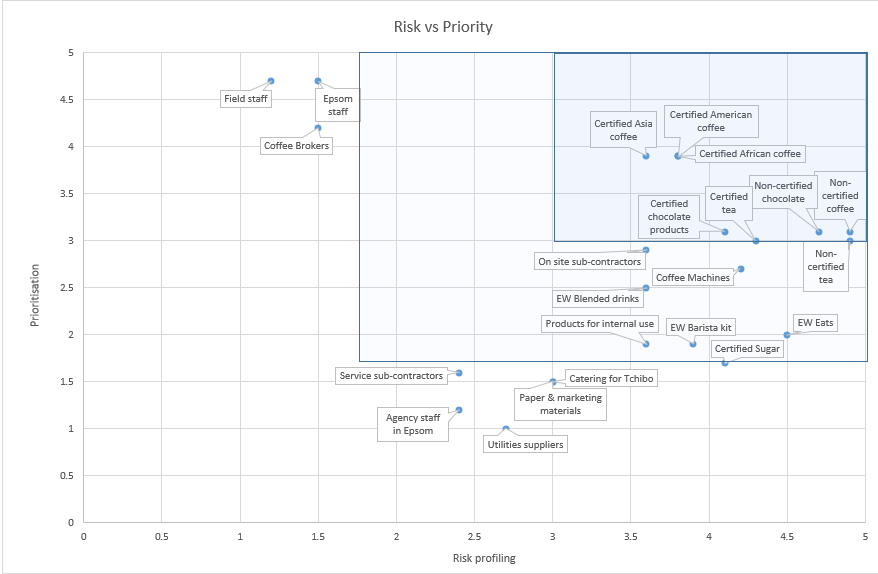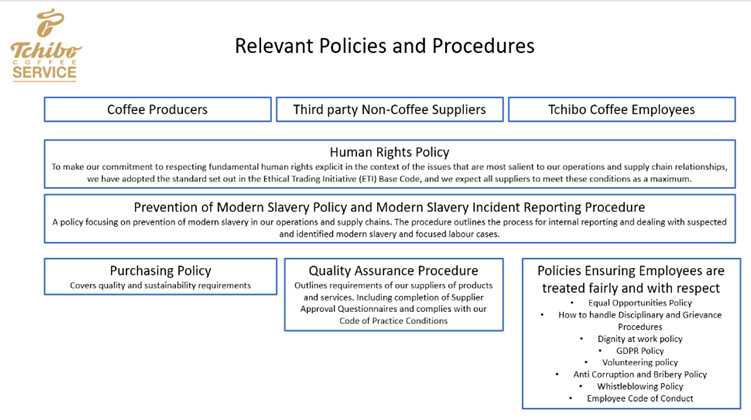Modern Slavery and Human Trafficking Statement by Tchibo Coffee International
Introduction
This statement sets out Tchibo Coffee International Limited’s actions to understand all potential modern slavery risks related in our business and to put in place steps that are aimed at ensuring that there is no slavery or human trafficking in our business and our supply chains. This statement relates to actions and activities during the financial year 1 April 2020 to 31 March 2021.
As part of the coffee industry, we recognise that we have a responsibility to take a robust approach to slavery and human trafficking.
We are committed to preventing slavery and human trafficking in our corporate activities, and to ensuring that our supply chains are free from slavery and human trafficking.
1. Organisational Structure, our Business and our Supply Chains
1.1 We are primarily a coffee distributor, offering fresh, sustainably-sourced coffees to businesses such as catering, university, hotels and convivence sectors in the UK and Ireland. We employ around 170 employees where half of these are field based who provide regular, face-to-face contact with customers. The remainder are office based that support the everyday function of our business from telesales, marketing, finance, commercial, customer support, HR, production and warehouse. Our customers range from cafés, restaurants, pubs and contract caterers and include both national retail chains and single-outlet independents.
1.2 Our founders first started the business selling coffee to the home consumer back in 1949, over 70 years ago. The business remains owned by the same family. Tchibo Coffee International Limited came to the UK in 1991 where we have grown through different sectors and channels of business. We continue to operate as a standalone entity but with a new platform for further expansion and innovation by operating within a group of like-minded companies consisting of Tchibo, Matthew Algie and Capitol Foods.
1.3 We source coffee to meet the requirements for our blends based upon quality, flavour, seasonality and sustainability. We have worked hard over the years to consolidate our supply chain and develop direct, long-term relationships with suppliers in coffee growing regions, though we buy green (unroasted) coffee through intermediary coffee traders who help facilitate the logistics and administration relating to our purchases. Our pioneering commitment to sustainability certifications complements our commitment to long-term relationships with suppliers. We launched in the UK a triple certified espresso (Fairtrade, Rainforest Alliance and Organic) in 2017, and more than 47% of the coffee we buy holds one or more of these certifications.
1.4 As well as coffee, we offer customers a convenient one stop shop, catering to all their needs. We mainly do this by working with selected third-party suppliers to offer customers a range of machines and “everything but the coffee” via our Espresso Warehouse brand. Our Espresso Warehouse catalogue range includes teas, hot chocolate powders, flavoured syrups, delicious treats and barista kits. Our commitment to sustainability certifications is maintained in these non-coffee products, with many of the relevant supply chains, most notably for our tea and hot chocolate products, holding Fairtrade, Rainforest Alliance or Organic certification.
1.5 The contents of this statement refer solely to steps taken by Tchibo Coffee International Limited, including the Espresso Warehouse business unit.
2. Countries of Operation
We currently operate in the following countries:
2.1 United Kingdom
2.2 Ireland
3. Assessment of Modern Slavery and Human Trafficking Risk in Our Business and Our Supply Chains
3.1 Tchibo holds human rights in the very highest regard and has a zero-tolerance approach to all human rights violations across the business and our supply chains.
3.2 We understand “modern slavery” to be when a person:
- holds another person in slavery or servitude,
- requires another person to perform forced or compulsory labour, or,
- arranges or facilitates the travel of another person with a view to them being exploited (human trafficking).
3.3 The outcomes of our assessment for 2020 are displayed in the below matrix. The results demonstrate few changes in 2020 and confirm that we should concentrate primarily on our coffee, tea and hot chocolate supply chains. “Agency staff in Glasgow” moved into the “low” category because we employed very few individuals on this type of temporary contract in 2020. We will continue to review the risk assessment on at least an annual basis to ensure our actions remain relevant.
Mapping the Risk Profile against Priority

3.4 Arabica coffee prices have been trading below the Fairtrade minimum price ($1.40/lb) since mid-2017. The sustained price slump has been caused by several factors including particularly strong output from the world’s largest coffee producing countries and record levels of speculative trading on coffee contracts putting further downward pressure on prices. The impact of the low prices continues to be reflected in the responses we have received to our annual supplier survey, where supplier’s average scores demonstrate that profitability of farms remains a key challenge. In this context, the risk of child labour in the coffee industry will have increased over the last few years, and it is particularly crucial that every stakeholder in the downstream coffee value chain plays their part in paying a fair price for the coffee that they buy.
3.5 Buying certified coffee helps to protect producers from these price slumps, but we are aware that many of the cooperatives we buy from will not be selling all of their coffee on Fairtrade and organic certified terms, meaning most of the organisations in our supply chains will still have been affected to some extent by the price decline.
3.6 The impact of the COVID-19 pandemic has been felt around the globe and our coffee suppliers are no exception. Coffee suppliers have indicated to us that one of the biggest challenges that the pandemic has brought about includes that there has been a reduction in demand. Furthermore, our survey results indicate that on average, our coffee suppliers have found it more difficult to access seasonal workers for example for picking. Both factors could have caused an increase in the risk of modern slavery in the context of smallholder coffee farms.
3.7 We continue to annually review our risk assessment looking specifically at our recruitment procedure. All the risks identified here rated as either low or medium risk based on probable frequency and level of severity or impact. The exercise was helpful for understanding where we can control the risk of modern slavery in our recruitment process and potential areas for improvement.
4. Policies and Procedures
4.1 The below diagram explains our existing policies and procedures which are of relevance to the prevention of modern slavery in our own operations and our supply chain.
4.2 Our Human Rights Policy is relevant to our internal operations and our supply chain and adds context to our longstanding commitment to the Ethical Trading Initiative Base Code. By signing up to the Code, employers agree that employment is freely chosen, child labour is not used, working hours are not excessive, fair wages are paid and no harsh treatment is allowed.

5. Our Training and Assessment of its Effectiveness
5.1 Risk Mitigation Within Our Operations
5.1.1 Our mitigation activities with respect to our own operations remains consistent with our approach in previous years. We have clearly defined roles and responsibilities, relevant and up-to-date policies and procedures, service level agreements with our temporary labour providers which they are audited against, and we provide relevant training to our employees. For more information, please refer to our previous annual statements.
5.1.2 The training that has been undertaken in 2020 to further improve the capabilities of our employees includes: 5.1.2.1 Refresher training in Human Rights for managers and supervisors. The training module is aimed to improve attendees understanding of modern slavery and what they as individuals can do to help prevent modern slavery and identify potential cases.
5.1.2.2 Our internal training module in Prevention of Modern Slavery in Supply Chains focuses on employees in roles relating to Purchasing, Technical/Quality Assurance and New Product Development who are directly in contact with third-party suppliers. As of the 31st December 2020, 19% of the relevant cohort of employees had completed refresher training, with the remainder due to complete it in January 2021. The training equips employees to understand the role they can play in risk mitigation in our supply chains, and, to be able to identify and deal with potential cases of modern slavery.
5.1.2.3 As noted above, we conducted our annual review of the risk of modern slavery in our recruitment process. In relation to this, we have introduced a more direct hiring process, meaning that in most cases we do not rely on intermediary recruitment agencies. Furthermore, we only ever use temporary agency labour where there is a specific need, and due to the impact of the COVID-19 pandemic on our business, we have employed very few individuals on this type of contract in 2020.
5.2 Risk Mitigation Within our Supply Chains As described in our previous statements, our visits to key coffee suppliers help us to fully understand the local context and consider the level of risk of modern slavery. In 2020 we were not able to complete visits as planned due to the COVID-19 travel restrictions that came into force. We have kept in regular contact with our supply chain and we have reached out to suppliers remotely to better understand the position that they are faced with and how they are addressing the challenges presented by the pandemic. For example, we included a new “COVID-19” section in our annual supplier survey.
6 Use of Certifications
6.1.1 Consistent with our approach in previous years, 8% of the coffee contracted in 2020 was Fairtrade certified and much of this volume held multiple certifications. Our commitment to these certifications stretches into the other products we source including tea, cocoa and sugar.
6.1.2 For the purposes of prevention of modern slavery, both the Fairtrade and Rainforest Alliance standards include criteria relating to social practices on the farm.
6.1.3 It was announced in 2017 that UTZ would merge with Rainforest Alliance and their new joint standard was published in 2020. Rainforest Alliance have introduced a new “assess-and-address”, risk-based approach that focuses on prevention, engagement, improvement, and incentivising farm owners to tackle issues, including forced/ child labour, rather than hiding them. The shift aligns with the growing international consensus around good practices in human rights due diligence as laid out by the United Nations Guiding Principles on Business and Human Rights and the Organisation for Economic Co-operation and Development Guidelines for Multinational Enterprises. More information on this is available in their “What’s in our 2020 Certification Program? Assess-and-Address” document.
7 Due Diligence
7.1.1 We undertake due diligence when considering taking on new suppliers, and regularly review our existing supplier relationships. Our due diligence and reviews include:
- 7.1.1.1 mapping the supply chain broadly to assess particular product or geographical risks of modern slavery and human trafficking;
- 7.1.1.2 evaluating the modern slavery and human trafficking risks of each new supplier
- 7.1.1.3 reviewing on a regular basis all aspects of the supply chain based on the supply chain mapping;
- 7.1.1.4 taking steps to improve substandard suppliers’ practices
- 7.1.1.5 participating in collaborative initiatives focused on human rights in general, and slavery and human trafficking in particular our company moto “Stronger together” initiative.
- 7.1.1.6 invoking sanctions against suppliers that fail to improve their performance in line with an action plan or seriously violate our supplier code of conduct, including the termination of the business relationship.
8 Performance indicators
We have reviewed our key performance indicators (KPIs) and are continuously reviewing our existing supply chains. This is expected to be completed in 2021.
9 Board approval
This statement is made pursuant to section 54(1) of the Modern Slavery Act 2015 and constitutes our slavery and human trafficking statement for the financial year ending 31 March 2021. This statement was approved on 6 May 2021 by the organisation’s board of directors, who review and update it annually.
Director’s name: Paul Chadderton
Date: 06.05.2021